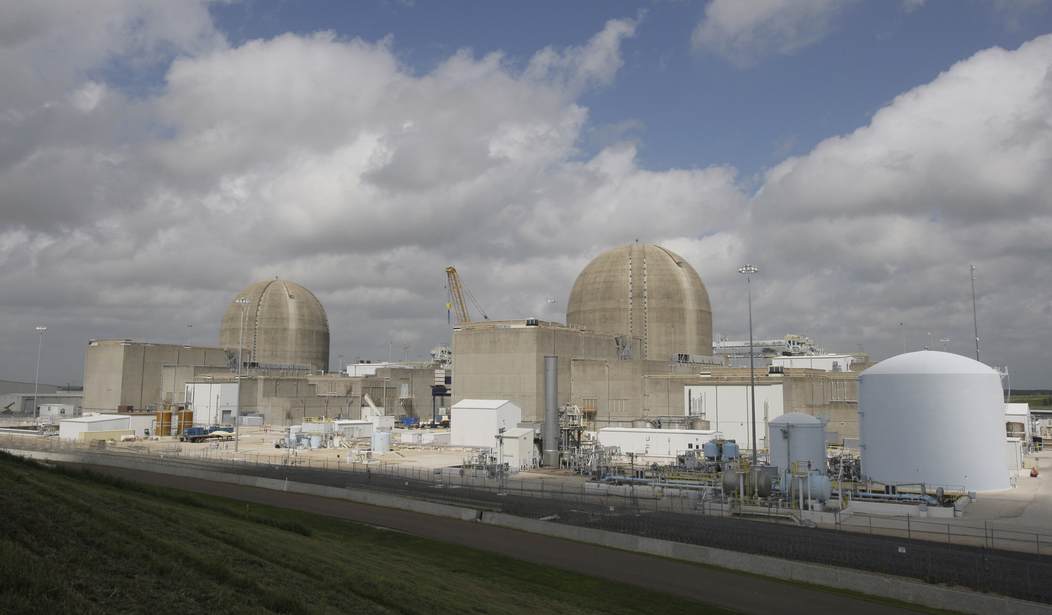I'm fond of the saying "We solve today's problems with tomorrow's technology." While I'm not one to describe Earth's ever-changing climate as a problem, the saying still applies to the carbon emissions that climate scolds are constantly hectoring us about. The emission of CO2 into the atmosphere from electrical generation by coal, oil, or natural gas will one day be reduced, but not because of the ear-piercing shrieks of those scolds. It will be reduced by the increasing adoption of cleaner, more efficient, higher energy-density technology.
Solar, wind, and other "renewable" sources are not what I'm talking about. Despite what climate scolds would have us believe, they are not more efficient, they are far less energy-dense, and when you factor in the extraction and production of solar panels and windmills, they aren't even necessarily cleaner.
I'm speaking, of course, of nuclear power, and now we see that a new project in Tennessee is taking things to the next level, with the first new, small modular reactor (SMR).
Gov. Bill Lee left no doubt he wants Tennessee to be the No. 1 state in nuclear energy innovation when he proposed an additional $92.6 million state investment to boost the sector.
The centerpiece of the proposed spending is a $50 million investment in the Tennessee Valley Authority's project to build the nation's first commercial small modular reactor at the Clinch River Site in Oak Ridge, Lee announced in his seventh State of the State address Feb. 10.
New nuclear development is led by Republican states, and Tennessee can expect the support of the Trump administration in the effort, Lee said. The sector is particularly valuable as a generator of high-paying jobs for the state, though it also made TVA a leader in decarbonization.
"We've now laid the groundwork. We have a willing partner in the White House. Now is the time to develop the Clinch River site and build the first small modular reactor in the nation on Tennessee soil," Lee said, to a standing ovation by state legislators.
"A willing partner in the White House" shouldn't be key; the Constitution doesn't contain any such enumerated power for the executive branch or Congress. But we are forced to deal with things as they are, which isn't always as they should be - and there's no doubt President Trump is energy-sector-friendly, far more so than his predecessor.
Now, as far as any involvement by the states, that's a different story. But this case, this new SMR, is being taken up by private companies, the state of Tennessee - and the federal Tennessee Valley Authority (TVA).
TVA, with private utilities and the state of Tennessee, wants to provide a model of public-private partnerships as it builds small modular reactors at the Clinch River Site. A team led by TVA applied for an $800 million Department of Energy grant in January to support the development of GE Hitachi Nuclear Energy's BWRX-300 design.
If the project is successful, it could make the U.S. design more attractive to international partners.
A key to competing with the state-owned nuclear programs of China, Russia and U.S. allies will be creating these kinds of public-private partnerships, said Jennifer Gordon, director of the nuclear energy policy initiative at the Atlantic Council, an international affairs think tank.
"There are a lot of ingredients here that will lead to perhaps Tennessee being the first mover," Gordon said in a lecture at the Baker School of Public Policy and Public Affairs at the University of Tennessee at Knoxville on Feb. 10.
"You have Oak Ridge, so everybody here knows what nuclear energy is, and I think people are not afraid of it in the same way that they might be in someplace like Hawaii."
This could not only solve a lot of issues with the United States' aging electrical grid by decentralizing it and modernizing it, but it might also create international opportunities for the companies producing the SMRs. These could be not only American game-changers but world game-changers; imagine a group of small African villages, or a small town in Siberia, or a small native village in Alaska, powered (if at all) by diesel generators, long-distance power lines, or other shaky and interruptible sources, but instead by a local SMR - clean, reliable, minimal maintenance.
See Related: Clean Energy: Two New 'Microreactor' Designs Could Be Game Changers
Climate Scold Claims on Nuclear v. Wind/Solar: The Math Doesn't Add Up
So, let the climate scolds scold. Their opposition to nuclear power has revealed who they really are; they aren't interested in Earth's climate, and they aren't interested in the temperature range at which the planet's thermostat is set. They oppose nuclear power not because it's not "green" - it's greener than many of the scold's preferred alternatives. They oppose nuclear power because abundant, reliable, cheap energy is the backbone of our modern, high-tech, free society.
It's that modern society they oppose; not for themselves, of course, but for the rest of us. In this, they are arrogant elitists, with sentiments much like that old (apocryphal) quote attributed to the Duke of Wellington, who supposedly said that he opposed passenger trains - then, also a new technology - claiming they would breed unrest and disorder by "allowing the lower orders to travel too freely about."
We solve today's problems with tomorrow's technology. Small modular reactors are about to be tomorrow's technology today. The climate scolds can't stop it.















Join the conversation as a VIP Member